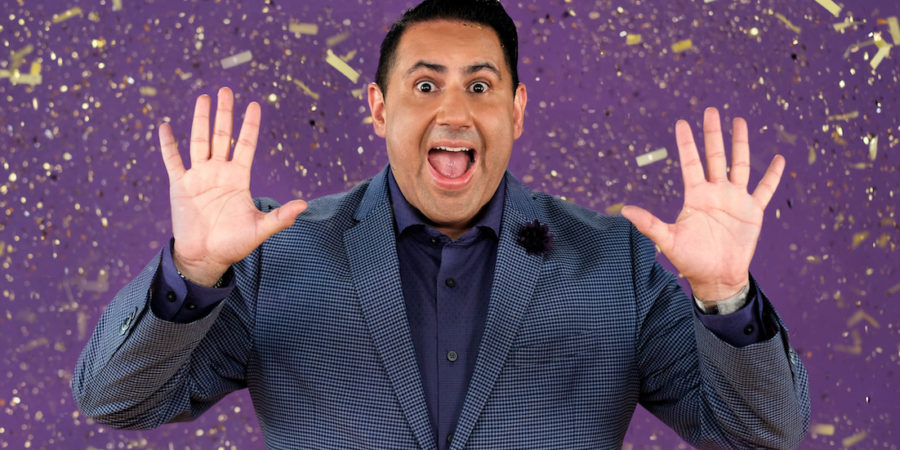Alexander Rodriguez’s life and career have always challenged labels and norms. The Los Angeles-based radio and television host — not to be confused with the baseball legend — was born into a Catholic Latino family in conservative Orange County. He didn’t fit in with the Orange County stereotypes, and due to his upbringing, it took him a while to get comfortable with his identity as a gay man and come out.
Rodriguez began his career in banking, where he quickly rose through the corporate ranks. Despite his success, his job was eating away at his soul. At one point, Rodriguez worked for his bank’s entertainment division, which allowed him to work with the entertainment industry. He has a large, hilarious personality, and at one industry event, an actress took notice. She helped Rodriguez land a gig as a host of the radio show “On The Rocks,” and five years later, he has no regrets about trading in his corporate suit for his job as an entertainment personality.
On his radio show, he interviews celebrities from all walks of life, some LGBTQ, while sharing cocktails and different perspectives. Rodriguez, now out and proud, says he doesn’t fit in with many of the gay stereotypes, and he loves taking every opportunity he can to show that we are all beautifully unique — and that’s how it should be.
Rodriguez uses labels when he has to, but he refuses to let them define him. He believes labels often create damage within the LGBTQ community. “We have so much to learn from everyone else’s story. That’s why when we put ourselves into boxes and labels — even within the LGBTQ community — it’s like, what are we doing here?” he says. “We have issues within our community of bullying, body shaming, age shaming, everything. We have to learn from everybody, even the person we don’t agree with. We all have similar things in our stories that make us who we are!”
This September, Rodriguez made history as one of the hosts of a groundbreaking new television show, Glitterbomb, airing on LATV. The English-language pop-culture show is the first talk show hosted by an all LGBTQ Latinx cast. Rodriguez and his two co-hosts, all entertainment industry insiders, share their various perspectives on a variety of topics. They also interview guests from all walks of life, with the goal of sharing differing views and creating a more inclusive culture in the often conservative Latino community.
This is Rodriguez’s story of coming out as gay in a Catholic Latino family, finding his voice as an entertainer, and working to create more inclusivity both inside and outside the LGBTQ+ community.
Profiles in Pride: When did you realize you were gay, and what did the coming out process look like for you?
Alexander Rodriguez: I realized I was gay when I was in high school, and I had a best friend I spent every single day and night with for around two years. We did our curious things, but I still wouldn’t be honest with myself even though I knew that we were in a relationship. We couldn’t be separated at all; we were addicted to each other! But I really came to terms with it when I was a sophomore in college.
I did my whole coming out during Thanksgiving and I made a big deal about it; I was crying. My mom was like, “What’s the big deal? Go wash the dishes!” It was a huge weight off my shoulders, but it took so long because I was raised in a Catholic environment. I went to Catholic school in Orange County, which is still so conservative — unless you look at Grindr!
It was not an option for me growing up. I had those sexual feelings, but I wasn’t able to connect that to an emotional level until I went to college. There I met openly gay people and was flirting with people and went on dates, and I realized, oh, I guess this is a lifestyle — you can live out and proud! So I actually learned from my peers in college who had been out for years.
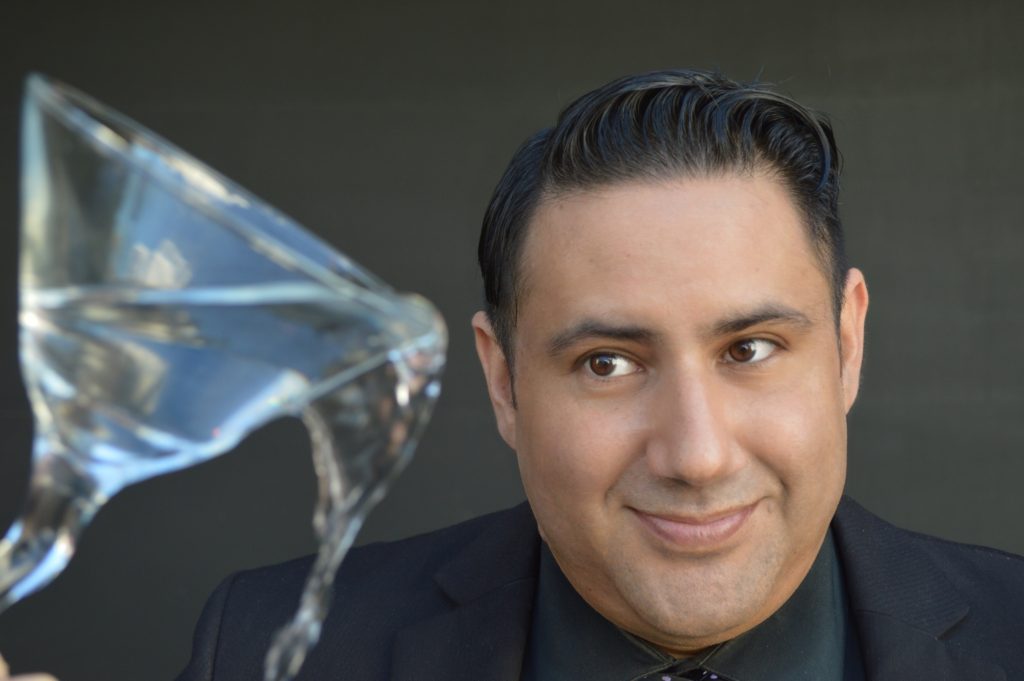
PIP: How did you get into the radio industry?
AR: I got my degree in theater directing, then I directed some theater. But I got involved in banking when I was a senior in high school as a part-time teller, and from there I kept rising through the ranks. I was one of the youngest vice presidents for a corporate bank, and for a decade my life was corporate banking. I don’t mean at the branch, I mean doing commercial loans and huge business relationships. I worked in the entertainment division of Citi National Bank where I came back into contact with the entertainment industry. But I was a banker: the suits, 60 hours a week, wining and dining clients, doing big presentations, doing $60 million loans — that was my life.
It was killing me; it was not my passion. I was so resentful because I was seeing other people do things I wanted to do. I went to a web series release party as part of my job and one of the actresses was there, and we shut the place down. It was her and me and many martinis, and she said, “You are so funny! I’m starting a new radio station, you should come have a radio show, you’d be great!” I had no idea about radio, so I went into her studio and we did some practice shows. It was natural, and five years later, that’s what I’m doing. I left the banking industry around four years ago.
PIP: That’s great. Tell us about the radio program you host, On the Rocks Radio Show.
AR: Yes, it’s my show, and I have guest co-hosts every week. It’s a radio show where celebrities and cocktails mix. I have many figures from the LGBT community, and I’m of course LGBT, but it’s all-inclusive; you never know who’s going to be sitting together. It’ll be an Academy Award winner next to a drag queen next to a porn star. I do celebrate the LGBT community, but both my guests and audience are from all over the spectrum.
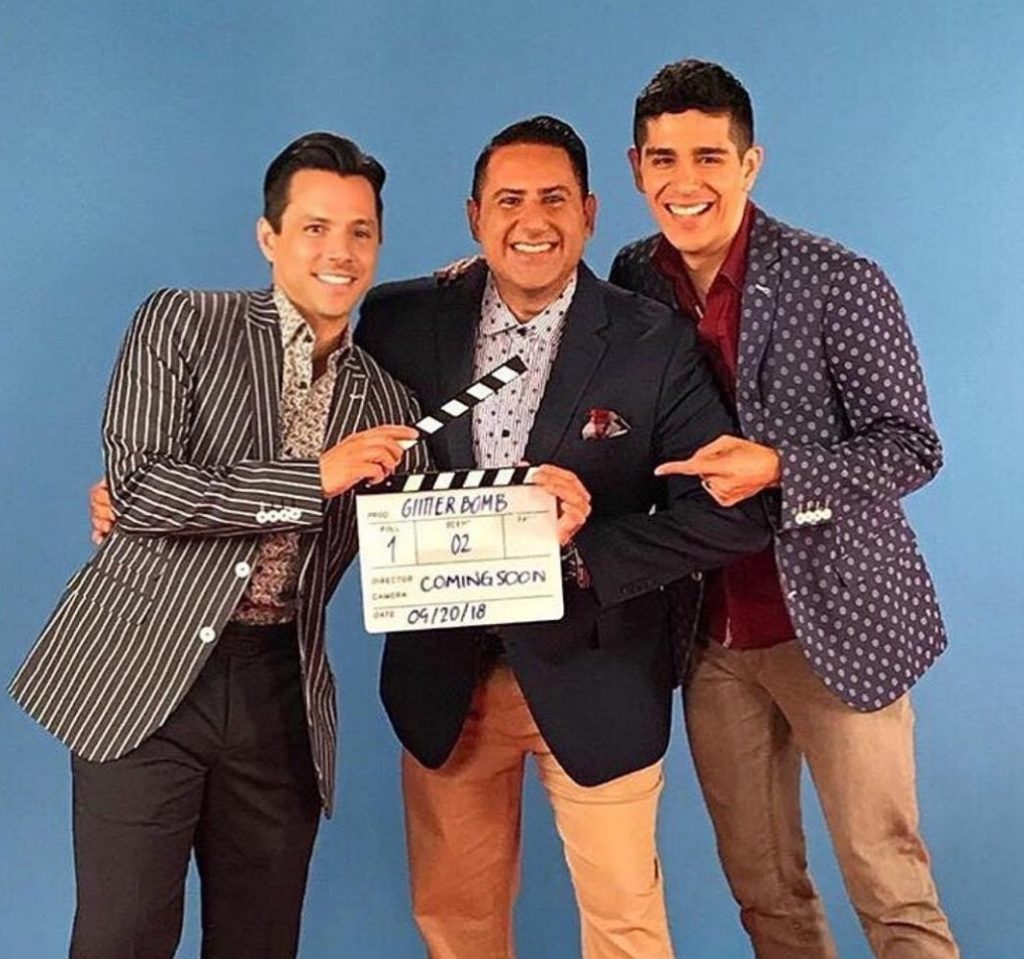
PIP: We’d love to hear about your new LGBTQ Latinx television talk show, Glitterbomb, hosted by you and two other gay Latinos in the entertainment industry.
AR: I’m very, very excited about Glitterbomb! It premiered September 20th. It’s making history as the first national Latinx-based LGBT program. We know the Latin community can be very conservative, and open talks with the LGBT community just don’t happen often due to religion and the whole machismo thing that men can’t like other men because it makes them less of a Latino. It’s me and two other hosts — Patrick Gomez, who’s the senior editor at Entertainment Weekly, and Enrique Sapene, a telenovela star.
It’s a really fun talk show — it’s like the gay View! We’re the gay hosts and we come at it from a different place. They’re married; I’m single for life! But we also have that sense of inclusivity. It’s a show that a boyfriend can be dragged into watch with his girlfriend and love it. It’s a show a family can watch. We interview everybody in entertainment: LGBT, all races, all ages. We’ve had everybody from Bravo TV people to the former Miss USA to people from film and TV. It’s really all over the map, and every show is so fun.
We start the show by dropping the bomb, where we talk about hot topics from each of our LGBT perspectives. The three of us do not always agree, but they’re topics that affect everyone and that everybody can relate to. Like, if you find your best friend’s boyfriend cheating, how much do you share on social media? Do you make politics part of your entertainment voice?
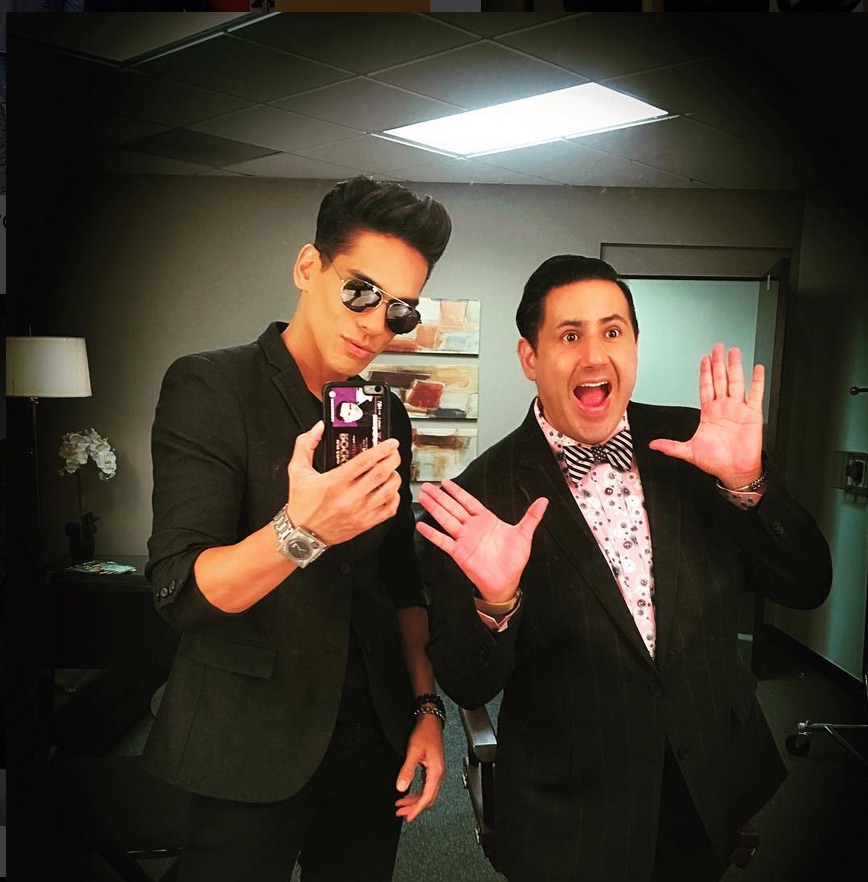
PIP: What do you hope to achieve with Glitterbomb, especially for the LGBTQ Latinx community?
AR: We want to open up conversations to communities that are not currently accepting LGBT discussions in their home, such as Latin communities and the super conservatives. We’re non-intrusive, which makes the show more available. We’re not the drag queen or half-naked go-go boys dancing around the stage. There’s a place for that, and I’m not admonishing that at all, but that’s not who the everyday gay person is. We’re showing that the everyday gay person is just like you and me, right across the street. It’s your neighbor, it’s your friend; it’s anybody. We have the same issues and we have the same sense of humor. What we really want to accomplish is having an open dialogue and show that gay people are just people.
Who’s really changing that in this whole Latinx movement is actually the youth of the nation. They’re getting politically active right now. Growing up in my generation, we had to do Rock the Vote and beg young people to come out to vote. That’s not happening anymore. The youth are going out to protest and they’re getting involved and becoming educated in our political system, which is great.
The youth in the Latino community have started this dialogue of being open LGBT members of the community. They’re not staying in the closet anymore; they’re having this confidence and this passion, and that’s what’s driving people out of the closet and into discussion. I’m so proud of our younger generation.
I was just in New Mexico hosting Out at the Fair, which is like gay days at the New Mexico State Fair. I did a twerking contest, and this 7-year-old boy came on stage. His whole, very Latino family was there; two brothers, the sister, and mom and dad, and they were waving the pride flag. The 7-year-old gets up and says, “I’m a drag performer and this is my drag name.” He did a death drop, and then the family stood up and cheered! It was such a touching moment! Number one that this kid had so much confidence, and two, that his family supported him. It was such a great experience.
PIP: Wow, that’s incredible. Are you involved with any other sorts of activism in the LGBTQIA community?
AR: Yes, I’ve been a very active volunteer. I’ve been on the board of the Long Beach Gay and Lesbian Center, I was on the young professional counsel at the Los Angeles LGBT Center, and I was a board member for Lifeworks, an LGBT youth mentoring organization. I’ve been on the board for Center for Health Justice, which promotes AIDS talks and condom distribution in prison. And I volunteer with Out at the Fair.
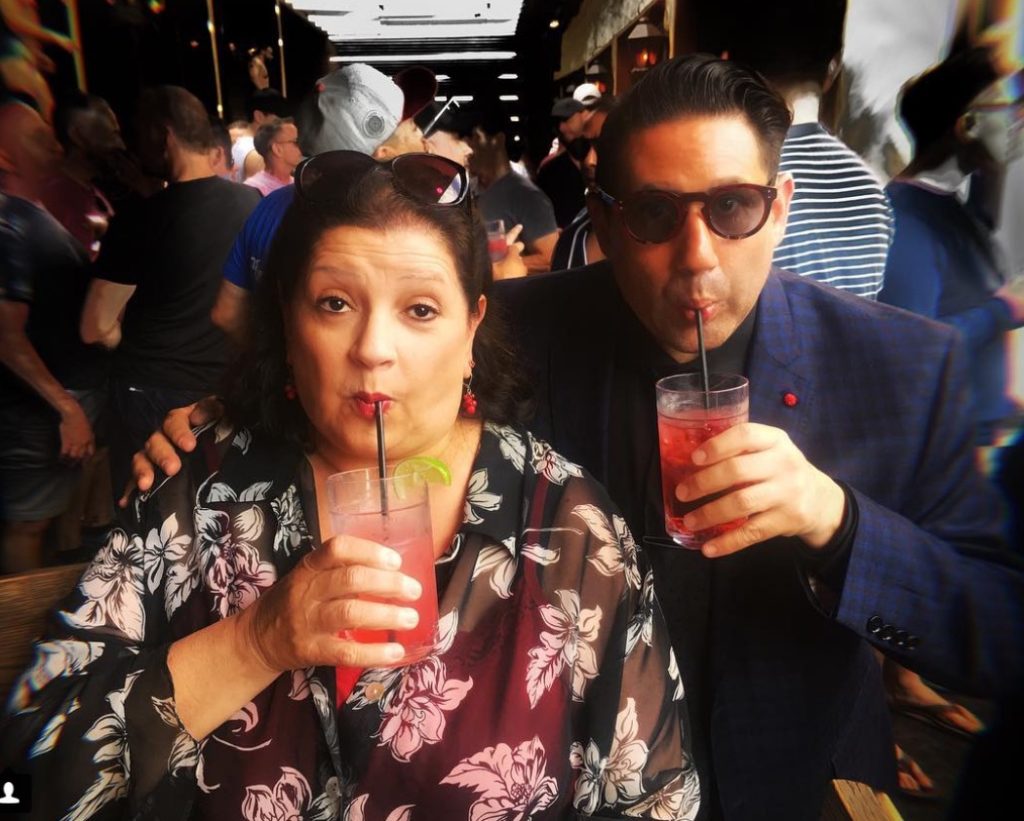
PIP: Wow, kudos for being so involved. So I know you’re very against letting labels define us in the LGBTQ community. Can you share your philosophy on that?
AR: We talked about this in terms of bullying within our community — I understand what a label is. Because if you live on a street, you have to give me that street name so I know exactly where to go. I think labels are good to understand where we’re coming from, but they’re not all that define us. When we won’t look outside of our labels, it’s so damaging. Not every person is alike.
For example, I’m gay, but I’m not at the gym at all. I’m a bear in the bear community, but I’m not wearing leather to pool parties. I’m from Orange County, but I am not some rich snobby person. These are all labels I just don’t fit into, and nobody fits in a box. That’s why we’re shaped differently and we talk differently. We have different likes and dislikes. Nobody teaches that.
We automatically come out having these differences, so when we only adhere to labels or when we get mad that other people won’t adhere to our labels or don’t understand our labels, we cut off that possibility of communication and people feel shut out.
Like this whole Scarlett Johansson thing: she was going to play a trans character in that movie. The whole LGBT community rallied against her and said, “No, you can’t play it because you’re not trans.” We showed an A-list Hollywood actor who has been supportive of our community that no, we don’t want to be inclusive — we’re exclusive and you are excluded from our group, even though she had the opportunity to tell a trans story to a whole Hollywood community that probably would have been nominated for Oscars and other awards.
We limit ourselves because we’re so angry about adhering to these labels. The movie isn’t even going to get made at this point. OK, great, you don’t want her to play it, so give me three trans A-list actresses right now instead. They’re just not there. I understand the work we have to do to get there, but not getting our story told on that level is not going to help us.
It’s so infuriating, and it happens within our own community. We’re yelling at Trumpers and at Republicans. But in our own community, we’re yelling at each other. The ageism, the sexism, the bullying, because we all have the labels. I’m a top, I’m a bottom. I’m a twink, I’m a bear, whatever. No. That’s fine for generalization, but that doesn’t define us. We’re only damaging ourselves if we use labels to cut off communication. I’m so adamant about that.
PIP: That makes sense. Is there anything else you want to share before we go?
AR: Yes, I really want to stress that friends can become family. I have a very interesting family dynamic; I was raised by my grandma and my mom, and you’d think that’s all the family I have, but it’s not. I have this huge Latino family that has been so unsupportive. They don’t know what the meaning of unconditional love is.
So even from an early age, even before I came out, I have learned that friends can become your family and you can categorize them as your family. They say blood is thicker than water, but that’s not the emotional truth. To anybody out there who is not getting what they need from their family: I know it’s difficult to not have your own family support you, but friends can be your family, so be family to your friends, too.
Keep up with Alexander on Instagram @AlexanderIsOnAir.

